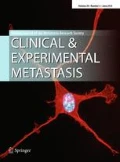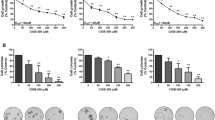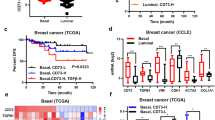Abstract
CXCL12/CXCR4 signaling, being important in the homing of cancer cells to lungs, bone and other organs, is a promising therapeutic target. Our purpose was to determine whether a peptide-based antagonist of CXCR4 would reduce primary tumor growth and/or metastasis in a preclinical mouse model of inflammatory breast cancer. We improved an existing model of inflammatory breast cancer for this study by luciferase transfection of SUM149 cells and the monitoring of such cells in mice by imaging and the luciferase assay. We implanted 2 × 106 SUM49-Luc cells along with matrigel into the left thoracic mammary fat pad of nude mice to produce tumors. Our mouse model exhibited important features of inflammatory breast cancer, namely, aggressive local disease, local metastases and distant metastases. To evaluate the efficacy of a CXCR4 antagonist CTCE-9908, by itself or in combination with paclitaxel, we treated groups of ten mice each with CTCE-9908 (25 mg/kg, injected subcutaneously 5 days/week), control peptide SC-9908, paclitaxel (10 mg/kg, injected subcutaneously twice a week), and CTCE-9908 plus paclitaxel concurrently. We assessed all mice weekly by whole-body luciferase imaging to quantify relative primary tumor burden and distant metastases. At the end of the experiment, we quantified primary tumors by weight and lung metastases by luciferase activity assay on tissue lysates. Paclitaxel, a known chemotherapeutic, inhibited primary tumor growth in our model (P < 0.05). CTCE-9908 did not significantly inhibit primary tumor growth or lung metastases as compared to control groups, without or with paclitaxel (P > 0.05). However, CTCE-9908 as a single therapy inhibited organ-specific metastasis to leg (P < 0.05 by chi-squared test and by two-sample t-test).







Similar content being viewed by others
References
Hance KW, Anderson WF, Devesa SS, Young HA, Levine PH (2005) Trends in inflammatory breast carcinoma incidence and survival: the surveillance, epidemiology, and end results program at the National Cancer Institute. J Natl Cancer Inst 97(13):966–975
Wu M, Merajver SD (2005–2006) Molecular biology of inflammatory breast cancer: applications to diagnosis, prognosis, and therapy. Breast Dis 22(1):25–34
Woodward WA, Cristofanilli M (2009) Inflammatory breast cancer. Semin Radiat Oncol 19(4):256–265
Huang EH, Singh B, Cristofanilli M, Gelovani J, Wei C, Vincent L, Cook KR, Lucci A (2009) A CXCR4 antagonist CTCE-9908 inhibits primary tumor growth and metastasis of breast cancer. J Surg Res 155(2):231–236
Muller A, Homey B, Soto H, Ge N, Catron D, Buchanan ME, McClanahan T, Murphy E, Yuan W, Wagner SN, Barrera JL, Mohar A, Verastegui E, Zlotnik A (2001) Involvement of chemokine receptors in breast cancer metastasis. Nature 410(6824):50–56
Fernandis AZ, Prasad A, Band H, Klosel R, Ganju RK (2004) Regulation of CXCR4-mediated chemotaxis and chemoinvasion of breast cancer cells. Oncogene 23(1):157–167
Murphy PM (2001) Chemokines and the molecular basis of cancer metastasis. N Engl J Med 345(11):833–835
Luker KE, Luker GD (2006) Functions of CXCL12 and CXCR4 in breast cancer. Cancer Lett 238(1):30–41
Singh B, Berry JA, Vincent LE, Lucci A (2006) Involvement of IL-8 in COX-2 mediated bone metastases from breast cancer. J Surg Res 134(1):44–51
Singh B, Berry JA, Shoher A, Ayers GD, Wei C, Lucci A (2007) COX-2 involvement in breast cancer metastasis to bone. Oncogene 26(26):3789–3796
Pan Q, Bao LW, Merajver SD (2003) Tetrathiomolybdate inhibits angiogenesis and metastasis through suppression of the NFkappaB signaling cascade. Mol Cancer Res 1(10):701–706
Kang Y, Siegel PM, Shu W, Drobnjak M, Kakonen SM, Cordon-Cardo C, Guise TA, Massague J (2003) A multigenic program mediating breast cancer metastasis to bone. Cancer Cell 3(6):537–549
Minn AJ, Gupta GP, Siegel PM, Bos PD, Shu W, Giri DD, Viale A, Olshen AB, Gerald WL, Massague J (2005) Genes that mediate breast cancer metastasis to lung. Nature 436(7050):518–524
Zhang D, Lafortune TA, Krishnamurthy S, Esteva FJ, Cristofanilli M, Liu P, Lucci A, Singh B, Hung MC, Hortobagyi GN, Ueno NT (2009) Epidermal growth factor receptor tyrosine kinase inhibitor reverses mesenchymal to epithelial phenotype and inhibits metastasis in inflammatory breast cancer. Clin Cancer Res 15(21):6639–6648
Allinen M, Beroukhim R, Cai L, Brennan C, Lahti-Domenici J, Huang H, Porter D, Hu M, Chin L, Richardson A, Schnitt S, Sellers WR, Polyak K (2004) Molecular characterization of the tumor microenvironment in breast cancer. Cancer Cell 6(1):17–32
Orimo A, Gupta PB, Sgroi DC, Arenzana-Seisdedos F, Delaunay T, Naeem R, Carey VJ, Richardson AL, Weinberg RA (2005) Stromal fibroblasts present in invasive human breast carcinomas promote tumor growth and angiogenesis through elevated SDF-1/CXCL12 secretion. Cell 121(3):335–348
Smith MCP, Luker KE, Garbow JR, Prior JL, Jackson E, Piwnica-Worms D, Luker GD (2004) CXCR4 regulates growth of both primary and metastatic breast cancer. Cancer Res 64(23):8604–8612
Lapteva N, Yang A, Sanders DE, Strube RW, Chen SY (2005) CXCR4 knockdown by small interfering RNA abrogates breast tumor growth in vivo. Cancer Gene Ther 12(1):84–90
Richert MM, Vaidya KS, Mills CN, Wong D, Korz W, Hurst DR, Welch DR (2009) Inhibition of CXCR4 by CTCE-9908 inhibits breast cancer metastasis to lung and bone. Oncol Rep 21(3):761–767
Porvasnik S, Sakamoto N, Kusmartsev S, Eruslanov E, Kim WJ, Cao W, Urbanek C, Wong D, Goodison S, Rosser CJ (2009) Effects of CXCR4 antagonist CTCE-9908 on prostate tumor growth. Prostate 69(13):1460–1469
Kwong J, Kulbe H, Wong D, Chakravarty P, Balkwill F (2009) An antagonist of the chemokine receptor CXCR4 induces mitotic catastrophe in ovarian cancer cells. Mol Cancer Ther 8(7):1893–1905
Kim SY, Lee CH, Midura BV, Yeung C, Mendoza A, Hong SH, Ren L, Wong D, Korz W, Merzouk A, Salari H, Zhang H, Hwang ST, Khanna C, Helman LJ (2008) Inhibition of the CXCR4/CXCL12 chemokine pathway reduces the development of murine pulmonary metastases. Clin Exp Metast 25(3):201–211
Kavsak PA, Henderson M, Moretto P, Hirte H, Evans K, Wong D, Korz W, Hotte SJ (2009) Biochip arrays for the discovery of a biomarker surrogate in a phase I/II study assessing a novel anti-metastasis agent. Clin Biochem 42(10–11):1162–1165
Cabioglu N, Gong Y, Islam R, Broglio KR, Sneige N, Sahin A, Gonzalez-Angulo AM, Morandi P, Bucana C, Hortobagyi GN, Cristofanilli M (2007) Expression of growth factor and chemokine receptors: new insights in the biology of inflammatory breast cancer. Ann Oncol 18(6):1021–1029
Cabioglu N, Sahin A, Doucet M, Yavuz E, Igci A, Yildirim E, Aktas E, Bilgic S, Kiran B, Deniz G, Price JE (2005) Chemokine receptor CXCR4 expression in breast cancer as a potential predictive marker of isolated tumor cells in bone marrow. Clin Exp Metast 22(1):39–46
Gonzalez-Angulo AM, Hennessy BT, Broglio K, Meric-Bernstam F, Cristofanilli M, Giordano SH, Buchholz TA, Sahin A, Singletary SE, Buzdar AU, Hortobágyi GN (2007) Trends for inflammatory breast cancer: is survival improving? Oncologist 12(8):904–912
Enderling H, Hlatky L, Hahnfeldt P (2009) Migration rules: tumours are conglomerates of self-metastases. Br J Cancer 100(12):1917–1925
Vermeulen PB, Van Laere SJ, Dirix LY (2009) Inflammatory breast carcinoma as a model of accelerated self-metastatic expansion by intravascular growth. Br J Cancer 101(6):1028–1029 author reply 1030
Norton L, Massague J (2006) Is cancer a disease of self-seeding? Nat Med 12(8):875–878
Acknowledgments
We thank Suren Soghomonyan (Department of Experimental Diagnostic Imaging) for help with the luciferase imaging, and Donald Wong and Walter Korz (Chemokine Therapeutics, Vancouver, BC) for discussions. These studies were supported in part by grants R21 DK067682 (AL) and CA16672 (Core) from the National Institutes of Health, DAMD17-03-1-0669 from the United States Army Medical Research and Material Command (AL), a research grant from Chemokine Therapeutics, Vancouver, BC, and Clinical Investigator Award from the Society of Surgical Oncology (AL).
Author information
Authors and Affiliations
Corresponding author
Rights and permissions
About this article
Cite this article
Singh, B., Cook, K.R., Martin, C. et al. Evaluation of a CXCR4 antagonist in a xenograft mouse model of inflammatory breast cancer. Clin Exp Metastasis 27, 233–240 (2010). https://doi.org/10.1007/s10585-010-9321-4
Received:
Accepted:
Published:
Issue Date:
DOI: https://doi.org/10.1007/s10585-010-9321-4




